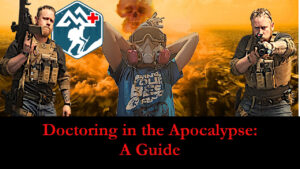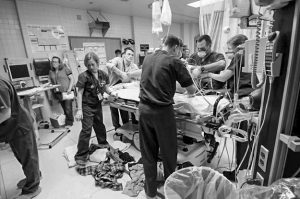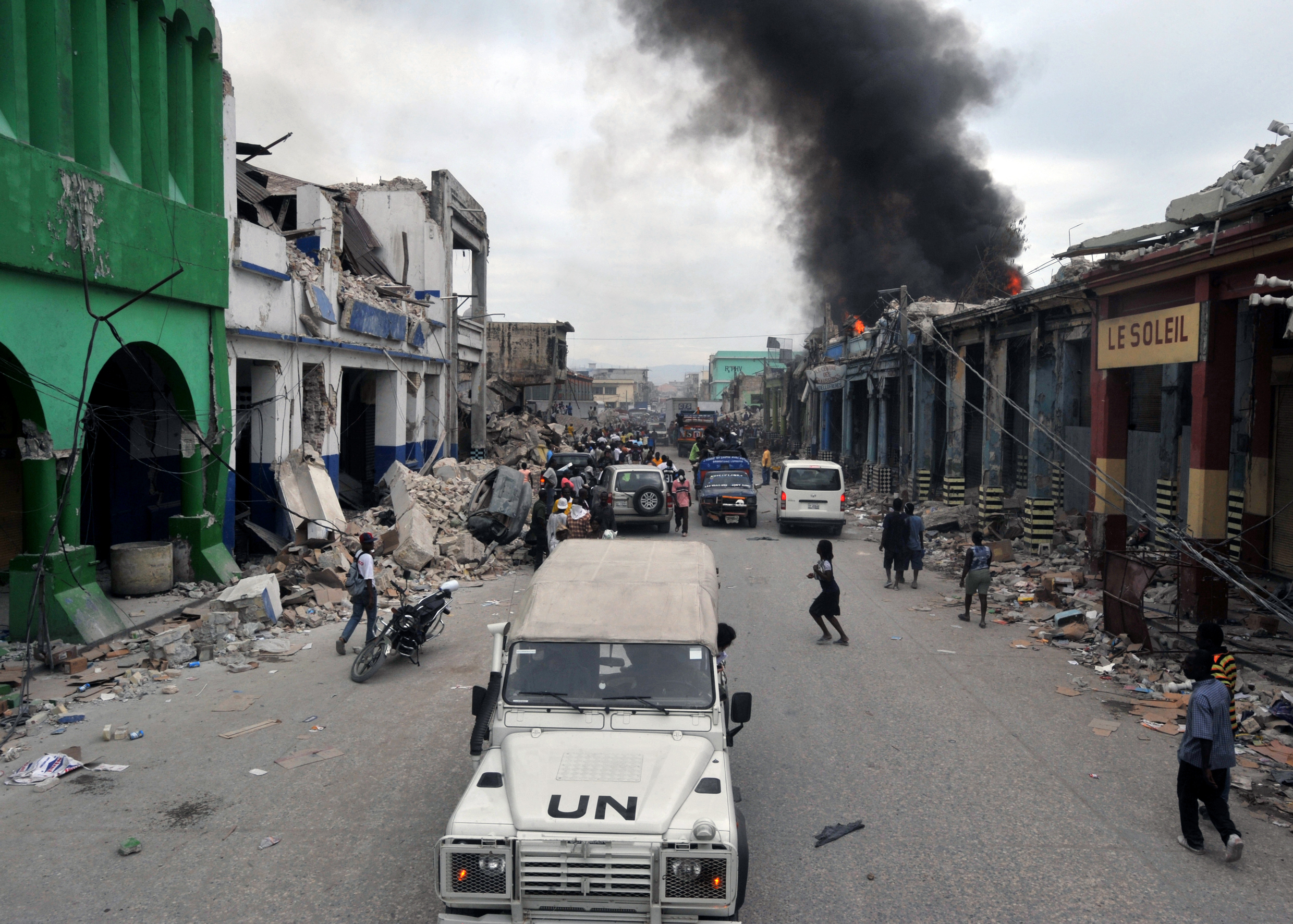Doctoring in the Apocalypse: A 9 Step Guide

There’s a prophet (profit?)
on every street corner
preaching the end times are nigh
“The Apocalypse!!” they scream
while waving at subscription buttons
“… is upon us!”
I dunno about all that. But I do know there could be times when a health care provider will be caught in a situation as dire as a short-term, or long-term collapse of society.
It’s weird out there and if you’re like me, you wonder what types of roles you might see yourself given a total collapse of society. As a person with a substantial amount of medical experience, I imagine myself back in my role as “Doc,” overseeing the health and care of my family, team, and community.

As an Apocalyptic Doctor, you will be working in adverse conditions almost exclusively.
I viewed my role of FMF Corpsman as one of an apocalypse doctor. The more you know your job, the better care your Marines receive and the better they can do their job and accomplish the mission. However, you’ll be expected to do it in the harshest of environments and situations.
This article dives into what doctoring through the apocalypse will involve and offers a guide of topics to study for those brave individuals who might find themselves stepping up to fill such an incredibly important position. Health care professionals have a unique responsibility and role in such crises, as their expertise becomes invaluable in preserving life and mitigating suffering.

A Doctor's Role in the Apocalypse
When SHTF, a doctor is an incredible value to everyone near them. Their responsibilities involve not only treating physical injuries and illnesses, but also providing emotional support and guidance to individuals facing the worst possible situations. At the end of the world, medical professionals must adapt, improvise, and prioritize effectively.
So, what’s up Doc, you ready for a challenge?
Here are 9 things to consider when doctoring through the End Times:
- Basic First Aid and Triage: To be an effective modern doctor means having numerous resources at your fingertips. X-rays, MRIs, lab testing, and ultrasound are just a few required tools doctors must have available to do their job effectively. In the apocalypse, none of these resources will be available and highly trained doctors will, in an instant, be reduced to overqualified EMTs.
During catastrophic events, the number of casualties will always surpass available resources. Healthcare providers need to be skilled in basic first aid and triage, ensuring the most critical cases receive immediate attention while assessing and addressing the needs of others as resources allow.
- Resource Management: A doctor's ability to manage limited resources, such as supplies and medications, is crucial. Everything will be hard to get, and stretching what you have and being able to think outside the box is what good medics live for. An Apocalypse Doctor is no different. Critical thinking, learning how to make the most of what's available, and improvising when necessary are vital skills.
- Infection Control: In an apocalyptic scenario, preventing the spread of diseases and infections is a top priority. Doctors must be knowledgeable in infection control practices and how to create makeshift clinics, or Basic Aid Stations. They must also ensure proper disposal of waste, trash, and sewage, and promote healthy living standards. Clean drinking water for all staff, patients, and civilian population is top priority.

- Psychological First Aid: A doctor’s responsibility to his patients doesn’t end with their physical body, but also extends to their emotional and sometimes spiritual wellbeing. They must provide psychological support and employ techniques for helping individuals cope with trauma and stress.
Often PTSD is effectively treated by giving the casualty a task to perform for the good of the community. After the 9/11 attacks on the World Trade Center, combat veterans reported a significant reduction in PTSD symptoms as they banded together with the rest of America against a common threat.
- Leadership and Communication: In times of crisis, medical professionals are often thrust into leadership roles. They may also be called on by military and Law Enforcement, or local organized gangs and militias. Be prepared to communicate diplomatically with many erratic and highly unstable people, who are going to want and/or demand your expertise.

- Sustainable Medicine: Learning how to utilize natural remedies (such as herbs and traditional healing methods) can be invaluable in situations where pharmaceuticals are scarce or unavailable. Obtain books about therapeutic local flora and learn how to properly obtain and utilize the medicinal properties. I highly recommend adding this book to your collection: Special Operations Medical Handbook.
- Adaptability: Doctors must be adaptable to changing circumstances and work in challenging environments. This includes being able to perform medical procedures in low-tech or makeshift settings. Kiss that pristine operating room goodbye and say hello to the dirty bombed out hotel room.
- Self-Care: Health care through an catastrophe will be emotionally and physically draining. Practicing self-care and maintaining one's own physical and mental health is crucial to providing effective care to your patients and community. Combat Medics like to say to each other, “Apply Your Own Tourniquet First!” This means, you gotta take care of you first. You’re no good to anyone dead.
And for f*** sake Doc, start working out now, when things are pleasant. The better condition your body is in the more decisive you’ll be, the less stress you’ll feel, and more likely you are to survive…
- Fighting: Let’s face it. Things are gonna be f***ing rough and you might need to fight for your life and/or the lives of your patients. Learn some basic striking and grappling skills. Familiarize yourself with a variety of weapons and most importantly, assemble and maintain a security staff of highly trained and dedicated men eager to do violence on behalf of you and your patients.
Doc's Wrap Up
Doctoring through Armageddon might seem impossible, but it highlights the critical role that medical professionals play in times of crisis and the incredible difference they can play in this game of life and death.
Anyone with a medical background, First Responders, CNAs, EMTs, Paramedics, Nurses, Doulas and Midwives could all find themselves in the role of community doctor. When they have more medical skills than everyone else in the room, they’re likely to be chosen for the position.
Being an end-of-the-world doctor isn't just about medical knowledge; it's about courage, adaptability, and a commitment to the well-being of your patients and community, even in the darkest of times.
Get started on your medical journey with a Free Online Course on Emergency Trauma Response and learn the basics of emergency bleeding control.

